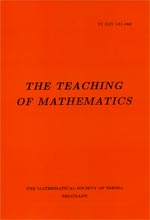
| Developing trustworthy TIMSS background measures: a case study on mathematics attitude |
| Djordje Kadijevich |
Abstract This study, which used a sample of 197,707 students from 46 countries that participated in the TIMSS 2003 project in eight grade, examined whether, for a large number of the TIMSS countries, trustworthy TIMSS measures of several dimensions of mathematics attitude can be developed. By focusing on self-confidence in learning mathematics, usefulness of mathematics, and liking mathematics, it was found that both factor validity and reliability of the measures of these three dimensions derived from the raw data was only attained for the students from the United States. However, when scores concerning the utilized attitudinal statements of all subjects were transformed into Guttman's image form scores, the factor validity and reliability of the three measures utilizing such transformed data was attained for thirty-three countries ($N=137{,}346$). It was found that for all these thirty-three countries mathematics attitude was mostly saturated by either usefulness of mathematics or self-confidence in learning mathematics. A higher mathematics achievement was found for countries where mathematics attitude was mostly saturated by self-confidence in learning mathematics. |
Keywords: TIMSS, mathematics attitude, factor validity, reliability, Guttman's image theory. |
Pages: 41$-$51 |
Volume IX , Issue 2 , 2006 |
